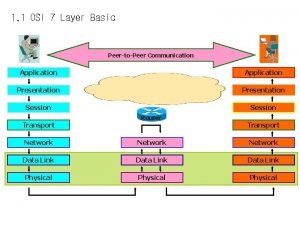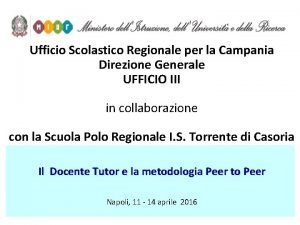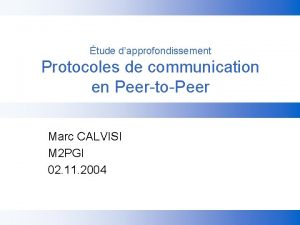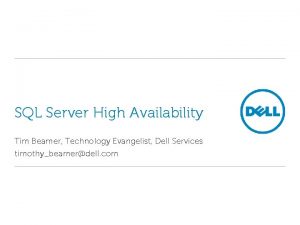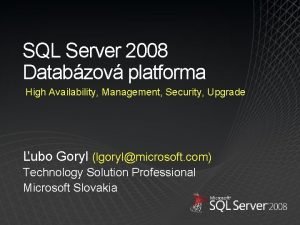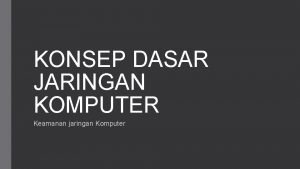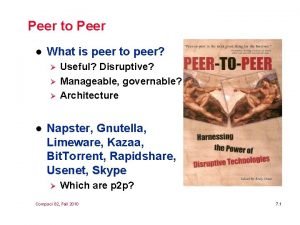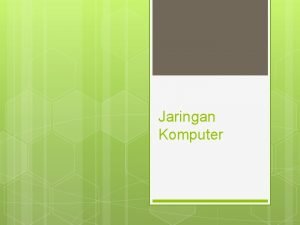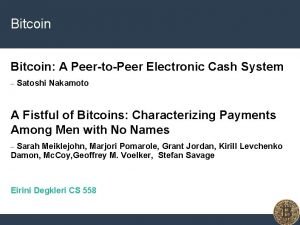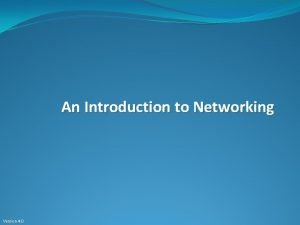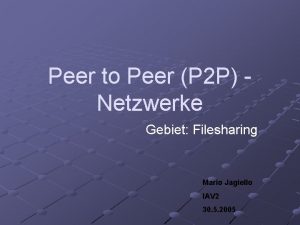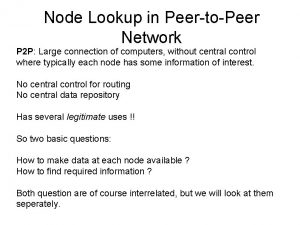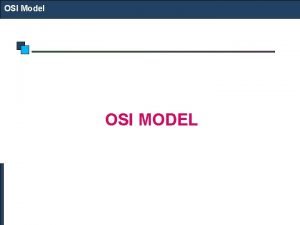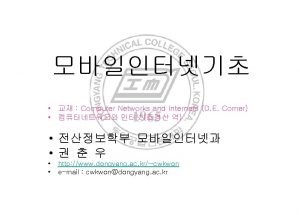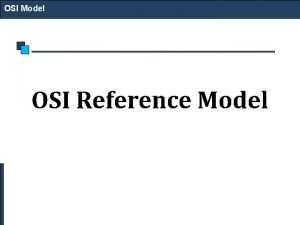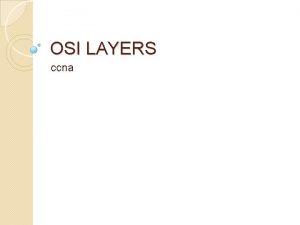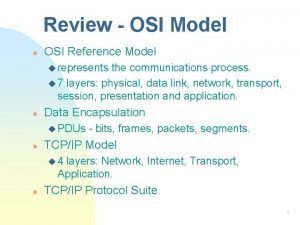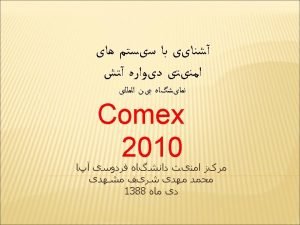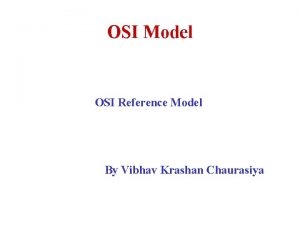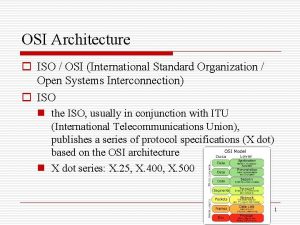OSI 2016 Peer Review Peer review is the















- Slides: 15

OSI 2016: Peer Review

Peer review is the worst form of evaluation except all those other forms that have been tried from time to time --with apologies to Winston Churchill

We recommend. . - a move to greater transparency and inclusiveness - exploring separating evaluation of rigour from its interest/originality to speed time to publication - that new approaches must lessen rather than increase burden of reviewing and decrease wastage - increasing evidence-based analysis of peer review - addressing incentives/motivations for peer review

We recognize. . . that there are differences among disciplines, publishing models, generations, platforms, etc. that affect the practicalities of implementation.

What is peer review? It is critical evaluation by relevant, non-biased experts who give constructive feedback. It provides validation of the scholarship with the goal of its improvement. It includes judgment of impact on and interest to field.

It’s not just the gatekeeping of the scholarly process.

Recommendations: “pre-publication” Encourage all stakeholders to use preprint servers so that work is available sooner to enable a wider review. Develop a more flexible, nonlinear process of peer review that facilitates many kinds of scholarly engagement and collaboration. Caveat: The type of review will depend on the output, its timing, and the stage at which it ought to be reviewed. Benefit: Establishing priority and increasing the speed at which information is disseminated, encouraging collaboration.

Recommendations - “traditional” process Work toward culture of open-ness. We need to hear from authors and the complete spectrum of stakeholders to do this. Explore problems, real and perceived, with transparency in peer review. Consider decoupling publication of reviews and disclosure of reviewer names. Are there areas where openness would not be appropriate, e. g. for ethical reasons?

Recommendations: post-“publication” May work best if it’s a FORMAL part of the process (vs. informal commentary) Version 1: F 1000 model: swift technical check followed by full peer review after publication (pubmed after 2 peer reviewers) Version 2: Post-publication review of traditional publications (e. g. incentivized crowd system that prevents trolling) Post-publication review may help with fraud detection and improving the literature, but also raises issues about versioning, citations etc.

Have we addressed weaknesses? Bias Doesn’t protect from fraud Delays publication Conflicts of interest No incentive (e. g credit)

Gatekeeping. . .

Issues…. Wait--should we hear from the authors? Open = info overload? Validation of review? Are we technologically ready for flooding preprint servers? Will this kill journals? Or what will the role of the journals be? Societies vs publishers? What is the sweet spot in the timeline for the open review? Is it field-dependent? Cost…. is shifted rather than reduced. Versioning costs? Can we kill the version of record? So things can be updated and re-reviewed. We need to see what is lost by these changes.

SWOT - Strengths Relies on trust/goodwill Trusted by researchers Peer review adds value Provides some level of validation by experts Mostly trusted by most research communities Imperfect, but the best system we have to date It does work within its limits Voluntary/free Encourages care and rigor Filters for a target audience Expert scrutiny Often leads to improvements or discovers flaws Adds credibility to published works Can sometimes spot flaws Improves papers when it works properly Improves science and stimulates thinking Sets criteria for acceptance, thereby motivating authors to improve quality (Ware, p 5) Favors discussion and feedback Tried and tested Careful reading is a benefit Weaknesses Lack of openness hides bias Bias: gender, affiliation, country, discipline Bias and empowering of certain views and/or paradigms Not transparent – biases go uncovered Current system allows bias to interfere with impartial analysis Reviewer COIs, Editor COIs Biases can interfere Single-blind peer review allows reviewers to veil criticism behind anonymity (Ware, 6) Not ‘blind’ enough Unintentionally promotes conservatism (especially grants, but that’s a different conference perhaps…) Doesn’t promote innovation Negative/inconclusive papers not published Dependent on trust- which is eroding Relies on trust/goodwill Perceived credibility No credit for reviewing Not designed to identify misconduct Not designed to detect fraud Doesn’t protect from fraud

SWOT - Weaknesses continued The current system doesn’t do a great job of addressing research misconduct Data in supplementary material often overlooked Complex methods in multidisciplinary papers Review of only one research object (article) at one time period Some faculty / ? ? ? feel that OA = pay to play and therefore unethical Little training for peer reviewers Increasingly difficult to find reviewers Open access journals may not attract quality reviewers Reviewers review for journals and editors, not for their peers Element of chance- only 2 or 3 reviewers out of many potential opinions No independent scrutiny and analysis Too few eyes The longest part of the publication process Can be time-consuming, slow Delays publication (Ware, p. 6) Takes too long Time delays Takes too long – important data withheld from public/researchers Reviewers at some journals delay publication by imposing burdensome/non-critical demands on authors Scooping Unwieldy system for managing is cost- and resource-intensive Peer review stops on publication Doesn’t add value

SWOT - Opportunities Pre- or post-publication review could be a new model Fully transparent post-publication review for journals Fully transparent pre-publication review for books Becoming more public Open, post-publication peer review Credit/recognition for reviewers an essential part of scholarly ecosystem Cascade review can reduce inefficiency (Ware, p. 19) Automation/de-skilling of some elements--leave it to people to judge results Quality/science/impact Better tools for matching qualified reviewers to content In an online environment it is possible to make peer review more of an ongoing process Open review promotes transparency (Ware, p. 13) Portable peer review Remove shackles of print/mail and develop existing system for digital world Threats Peer review is an attention portal that adds value, so changing it could be threatening It is unclear whether researchers will continue devoting time to peer review if they are not incentivised to do so If not done by the journal where does that leave the journal? Does it matter? “Managing peer review” becomes commercial product People thinking it’s fixed Novel ideas and emerging subjects disadvantaged Throw everything online and hope for the best leads to lots of shoddy information Flawed research still gets published, e. g. STAP, Benveniste etc Closing the scientific mind Gaming/fraud/cheaing Bias Corruption Time (waste of extensive amount of time finding reviewers)
 Peer-to-peer communication in osi model
Peer-to-peer communication in osi model Annotazioni sulla verifica effettuata peer to peer
Annotazioni sulla verifica effettuata peer to peer Peer-to-peer
Peer-to-peer Tim beamer
Tim beamer Peer to peer transactional replication
Peer to peer transactional replication Gambar topologi peer to peer
Gambar topologi peer to peer Esempio registro peer to peer compilato
Esempio registro peer to peer compilato Sviluppo condiviso esempi di peer to peer compilati
Sviluppo condiviso esempi di peer to peer compilati Registro peer to peer compilato
Registro peer to peer compilato Peer to peer l
Peer to peer l Peer to peer merupakan jenis jaringan… *
Peer to peer merupakan jenis jaringan… * Bitcoin: a peer-to-peer electronic cash system
Bitcoin: a peer-to-peer electronic cash system Features of peer to peer network and client server network
Features of peer to peer network and client server network Programmazione e sviluppo condiviso peer to peer
Programmazione e sviluppo condiviso peer to peer Peer to p
Peer to p Addresss look up
Addresss look up
